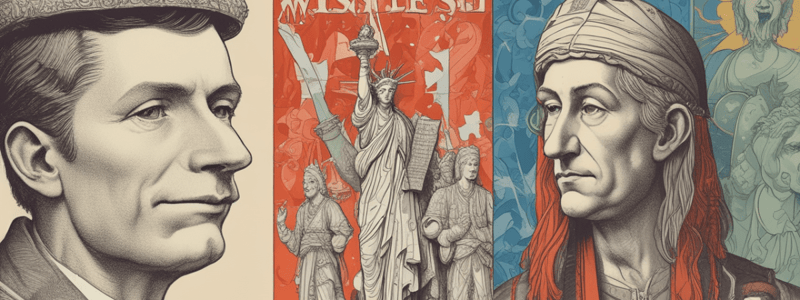Podcast
Questions and Answers
What is the primary focus of Political Theory in comparative politics?
What is the primary focus of Political Theory in comparative politics?
- Formulating hypotheses and testing them
- Classifying institutions and actors
- Describing and making inferences about the political world
- Providing normative conception of reality (correct)
Which of the following thinkers is NOT associated with political theory?
Which of the following thinkers is NOT associated with political theory?
- Max Weber
- Aristotle
- Lijphart
- Gilpin (correct)
What is the primary goal of comparative politics?
What is the primary goal of comparative politics?
- To predict the outcome of political events
- To describe and classify institutions and actors
- To explain and formulate hypotheses about political phenomena (correct)
- To provide normative judgments about political institutions
What is the term for the process of making a decision authoritative?
What is the term for the process of making a decision authoritative?
Which of the following is an example of a research question in comparative politics?
Which of the following is an example of a research question in comparative politics?
What is the term for informal political institutions?
What is the term for informal political institutions?
What is the central idea of the Iron Law of Oligarchy?
What is the central idea of the Iron Law of Oligarchy?
What is the primary effect of the simple-majority single-ballot system on political parties?
What is the primary effect of the simple-majority single-ballot system on political parties?
Who established the first separate school of political science in France in 1872?
Who established the first separate school of political science in France in 1872?
What is the primary criticism made by Walter Lippmann about the role of newspapers in a democracy?
What is the primary criticism made by Walter Lippmann about the role of newspapers in a democracy?
What is the primary focus of the behavioural revolution in political science?
What is the primary focus of the behavioural revolution in political science?
What are the two main theoretical approaches to comparative politics mentioned in the text?
What are the two main theoretical approaches to comparative politics mentioned in the text?
What aspect of comparative politics involves understanding individual influences?
What aspect of comparative politics involves understanding individual influences?
Which theoretical approach focuses on the role of global factors in shaping comparative politics?
Which theoretical approach focuses on the role of global factors in shaping comparative politics?
What aspect of comparative politics involves the study of ideas and their impact on policy?
What aspect of comparative politics involves the study of ideas and their impact on policy?
Which theoretical approach focuses on the role of interests and interest groups in shaping comparative politics?
Which theoretical approach focuses on the role of interests and interest groups in shaping comparative politics?
What aspect of comparative politics involves the study of how individuals interact with their environment?
What aspect of comparative politics involves the study of how individuals interact with their environment?
Which theoretical approach focuses on the role of the global environment in shaping comparative politics?
Which theoretical approach focuses on the role of the global environment in shaping comparative politics?
What aspect of comparative politics involves the study of how individuals shape policy and governance?
What aspect of comparative politics involves the study of how individuals shape policy and governance?
Which theoretical approach focuses on the role of ideas and interests in shaping comparative politics?
Which theoretical approach focuses on the role of ideas and interests in shaping comparative politics?
Aristotle's definition of politics is focused on the notion of power.
Aristotle's definition of politics is focused on the notion of power.
Comparative politics involves the study of international relations and value-laden conceptions of reality.
Comparative politics involves the study of international relations and value-laden conceptions of reality.
Max Weber defined politics as 'what makes a decision authoritative'.
Max Weber defined politics as 'what makes a decision authoritative'.
Roberto Michels is associated with the concept of political theory.
Roberto Michels is associated with the concept of political theory.
Comparative politics involves the study of how institutions shape individual behavior.
Comparative politics involves the study of how institutions shape individual behavior.
Gilpin, Waltz, and Mershaimer are associated with political theory.
Gilpin, Waltz, and Mershaimer are associated with political theory.
The École Libre des Sciences Politiques was established in 1899 in France.
The École Libre des Sciences Politiques was established in 1899 in France.
Walter Lippmann was a proponent of the idea that newspapers are a panacea for democratic defects.
Walter Lippmann was a proponent of the idea that newspapers are a panacea for democratic defects.
The simple-majority system with second ballot always leads to a two-party system.
The simple-majority system with second ballot always leads to a two-party system.
The Iron Law of Oligarchy states that every organization eventually ends up in a democracy.
The Iron Law of Oligarchy states that every organization eventually ends up in a democracy.
Maurice Duverger was a 19th-century French political scientist.
Maurice Duverger was a 19th-century French political scientist.
The behavioural revolution in political science focused on the study of institutions and institutional change.
The behavioural revolution in political science focused on the study of institutions and institutional change.
The theoretical approach of International Environment in comparative politics focuses on the role of global factors in shaping politics.
The theoretical approach of International Environment in comparative politics focuses on the role of global factors in shaping politics.
The theoretical approach of Individuals in comparative politics involves the study of how institutions shape policy and governance.
The theoretical approach of Individuals in comparative politics involves the study of how institutions shape policy and governance.
The theoretical approach of Ideas in comparative politics involves the study of how institutions shape policy and governance.
The theoretical approach of Ideas in comparative politics involves the study of how institutions shape policy and governance.
The theoretical approach of Interests in comparative politics focuses on the role of individual influences in shaping policy and governance.
The theoretical approach of Interests in comparative politics focuses on the role of individual influences in shaping policy and governance.
The theoretical approach of Interaction in comparative politics involves the study of how global factors shape policy and governance.
The theoretical approach of Interaction in comparative politics involves the study of how global factors shape policy and governance.
The theoretical approach of International Environment in comparative politics is also known as Global Environment.
The theoretical approach of International Environment in comparative politics is also known as Global Environment.
The theoretical approach of Ideas in comparative politics focuses on the study of how individual influences shape policy and governance.
The theoretical approach of Ideas in comparative politics focuses on the study of how individual influences shape policy and governance.
The theoretical approach of Interests in comparative politics involves the study of how institutions shape policy and governance.
The theoretical approach of Interests in comparative politics involves the study of how institutions shape policy and governance.
What is the primary difference between the simple-majority single-ballot system and the simple-majority system with second ballot in terms of their impact on the number of political parties?
What is the primary difference between the simple-majority single-ballot system and the simple-majority system with second ballot in terms of their impact on the number of political parties?
How does Walter Lippmann's critique of newspapers in a democracy relate to the concept of public opinion?
How does Walter Lippmann's critique of newspapers in a democracy relate to the concept of public opinion?
What is the key distinction between the institutional approach and the interests approach in comparative politics?
What is the key distinction between the institutional approach and the interests approach in comparative politics?
How does the Iron Law of Oligarchy relate to the concept of democratic decision-making?
How does the Iron Law of Oligarchy relate to the concept of democratic decision-making?
What is the significance of the École Libre des Sciences Politiques in the development of comparative politics?
What is the significance of the École Libre des Sciences Politiques in the development of comparative politics?
How does the behavioural revolution in political science relate to the study of comparative politics?
How does the behavioural revolution in political science relate to the study of comparative politics?
What is the primary focus of the theoretical approach of Interaction in comparative politics?
What is the primary focus of the theoretical approach of Interaction in comparative politics?
What is the central idea of the theoretical approach of Ideas in comparative politics?
What is the central idea of the theoretical approach of Ideas in comparative politics?
What is the primary focus of the theoretical approach of Individuals in comparative politics?
What is the primary focus of the theoretical approach of Individuals in comparative politics?
What is the primary focus of the theoretical approach of Interests in comparative politics?
What is the primary focus of the theoretical approach of Interests in comparative politics?
What is the primary focus of the theoretical approach of International Environment in comparative politics?
What is the primary focus of the theoretical approach of International Environment in comparative politics?
What is the primary goal of comparative politics?
What is the primary goal of comparative politics?
What is the primary focus of Political Theory in comparative politics?
What is the primary focus of Political Theory in comparative politics?
What is the primary focus of the behavioural revolution in political science?
What is the primary focus of the behavioural revolution in political science?
What is the primary focus of comparative politics, and how does it differ from political theory and international relations?
What is the primary focus of comparative politics, and how does it differ from political theory and international relations?
How do informal political institutions differ from formal institutions, and what is the significance of this distinction in comparative politics?
How do informal political institutions differ from formal institutions, and what is the significance of this distinction in comparative politics?
What is the significance of the concept of 'authoritative decision-making' in understanding the nature of politics, and how does it relate to the concept of power?
What is the significance of the concept of 'authoritative decision-making' in understanding the nature of politics, and how does it relate to the concept of power?
What is the primary goal of comparative politics, and how does it differ from other fields of political science?
What is the primary goal of comparative politics, and how does it differ from other fields of political science?
How do the theoretical approaches of interests, ideas, and international environment shape our understanding of comparative politics, and what are the strengths and limitations of each approach?
How do the theoretical approaches of interests, ideas, and international environment shape our understanding of comparative politics, and what are the strengths and limitations of each approach?
What is the significance of the concept of 'value-laden' in comparative politics, and how does it relate to the concept of normative conceptions of reality?
What is the significance of the concept of 'value-laden' in comparative politics, and how does it relate to the concept of normative conceptions of reality?
Aristotle lived from ______ to ______.
Aristotle lived from ______ to ______.
According to Max Weber, ______ makes a decision authoritative.
According to Max Weber, ______ makes a decision authoritative.
Comparative politics involves the study of ______ and international relations.
Comparative politics involves the study of ______ and international relations.
Roberto Michels is associated with the concept of the ______ of Oligarchy.
Roberto Michels is associated with the concept of the ______ of Oligarchy.
Comparative politics involves the study of how ______ shape policy and governance.
Comparative politics involves the study of how ______ shape policy and governance.
Gilpin, Waltz, and Mershaimer are associated with ______.
Gilpin, Waltz, and Mershaimer are associated with ______.
Every organization, eventually, ends up in an ______.
Every organization, eventually, ends up in an ______.
Maurice Duverger's laws favour ______ and multipartism.
Maurice Duverger's laws favour ______ and multipartism.
The first separate school of political science was established in ______ in France.
The first separate school of political science was established in ______ in France.
Walter Lippmann wrote that newspapers ______ reflect and intensify the defective organization of public opinion.
Walter Lippmann wrote that newspapers ______ reflect and intensify the defective organization of public opinion.
The theoretical approach of ______ in comparative politics involves the study of how institutions shape policy and governance.
The theoretical approach of ______ in comparative politics involves the study of how institutions shape policy and governance.
The French political scientist Maurice Duverger lived from ______ to ______.
The French political scientist Maurice Duverger lived from ______ to ______.
The theoretical approaches of comparative politics involve the study of ______ and interest groups.
The theoretical approaches of comparative politics involve the study of ______ and interest groups.
The ______ approach in comparative politics focuses on the role of global factors in shaping politics.
The ______ approach in comparative politics focuses on the role of global factors in shaping politics.
The ______ approach in comparative politics involves the study of how individuals interact with their environment.
The ______ approach in comparative politics involves the study of how individuals interact with their environment.
Comparative politics involves the study of ______ relations and value-laden conceptions of reality.
Comparative politics involves the study of ______ relations and value-laden conceptions of reality.
The ______ revolution in political science focused on the study of individual behavior and attitudes.
The ______ revolution in political science focused on the study of individual behavior and attitudes.
The theoretical approach of ______ in comparative politics involves the study of how ideas shape policy and governance.
The theoretical approach of ______ in comparative politics involves the study of how ideas shape policy and governance.
The ______ approach in comparative politics involves the study of how institutions shape individual behavior.
The ______ approach in comparative politics involves the study of how institutions shape individual behavior.
The primary goal of comparative politics is to understand the ______ of political systems and institutions.
The primary goal of comparative politics is to understand the ______ of political systems and institutions.
Match the following theorists with their contributions to comparative politics:
Match the following theorists with their contributions to comparative politics:
Match the following approaches with their foci in comparative politics:
Match the following approaches with their foci in comparative politics:
Match the following theorists with their areas of expertise:
Match the following theorists with their areas of expertise:
Match the following concepts with their definitions:
Match the following concepts with their definitions:
Match the following terms with their meanings in comparative politics:
Match the following terms with their meanings in comparative politics:
Match the following researchers with their areas of study:
Match the following researchers with their areas of study:
Match the following concepts in comparative politics with their definitions:
Match the following concepts in comparative politics with their definitions:
Match the following theorists with their contributions to comparative politics:
Match the following theorists with their contributions to comparative politics:
Match the following approaches in comparative politics with their focuses:
Match the following approaches in comparative politics with their focuses:
Match the following concepts in comparative politics with their descriptions:
Match the following concepts in comparative politics with their descriptions:
Match the following concepts in comparative politics with their effects:
Match the following concepts in comparative politics with their effects:
Match the following institutions with their significance in comparative politics:
Match the following institutions with their significance in comparative politics:
Match the theoretical approaches of comparative politics with their descriptions:
Match the theoretical approaches of comparative politics with their descriptions:
Match the theoretical approaches of comparative politics with their focuses:
Match the theoretical approaches of comparative politics with their focuses:
Match the theoretical approaches of comparative politics with their emphases:
Match the theoretical approaches of comparative politics with their emphases:
Match the theoretical approaches of comparative politics with their concerns:
Match the theoretical approaches of comparative politics with their concerns:
Match the theoretical approaches of comparative politics with their areas of study:
Match the theoretical approaches of comparative politics with their areas of study:
Match the theoretical approaches of comparative politics with their foci:
Match the theoretical approaches of comparative politics with their foci:
Match the theoretical approaches of comparative politics with their emphases:
Match the theoretical approaches of comparative politics with their emphases:
Match the theoretical approaches of comparative politics with their concerns:
Match the theoretical approaches of comparative politics with their concerns:
Flashcards are hidden until you start studying




